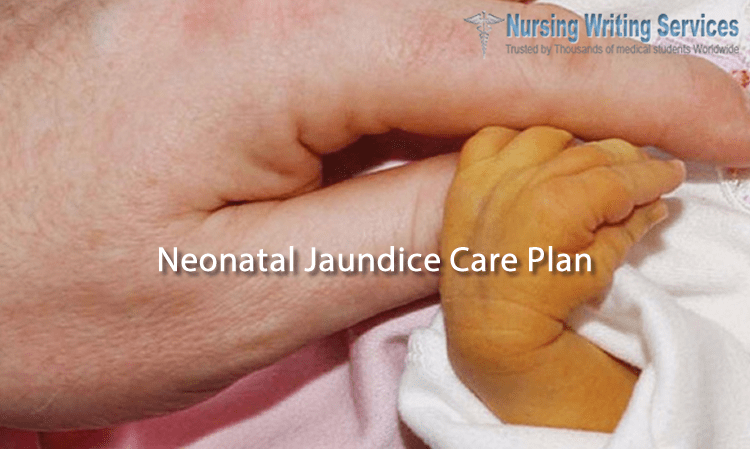
Neonatal Jaundice is discoloration of the skin, mucous membrane, and the eye whites. They turn yellowish. It mostly occurs in newborns usually after 24 hours of birth and young babies. Such babies are found to have an excess amount of bilirubin in their blood. It is very important for the nurse or the doctor examining infant jaundice to have a very clear nursing care plan. It helps keep the record of the diagnosis and treatment process throughout the period. It is essential to seek neonatal jaundice care plan writing help to come up with a consistent care plan for the infant jaundice record.
There are several other likely causes of jaundice. Over-feeding with breast milk is one of the most common reasons. Since the liver of a baby is too small, it is beyond its capacity to cope with enzymes in milk especially after overfeeding. A physical defect of the liver and anemia are other causes.
Neonatal Jaundice Care Plan Diagnosis
It is essential that a nurse makes a proper diagnosis to determine if a child indeed has jaundice by checking the existence of these symptoms.
- Yellow-orange skin color
- Yellow mucous membranes
- Yellow sclera
- Abnormal blood profile with total serum bilirubin in the high-risk range on age in hour-specific nomogram
- Unusual weight loss (7-8% for breastfeeding newborn)
- Unpredictable feeding pattern
- Difficulty in transitioning to extrauterine life
- Delayed passage of stool
Neonatal Jaundice Care Plan Goals and Outcomes
A caregiver should prepare a care plan that helps the neonate to recover and live a healthy lifestyle by achieving these outcomes at the end of the care period.
- Establish a useful feeding pattern whether by bottle or breast that enhances regular bowel movement.
- Eliminate injury due to increasing serum bilirubin levels
- Arrange for the neonate to receive the right therapy to enhance secretion of bilirubin
Neonatal Jaundice Care Plan Assessment and Rationales
It is important from a caregiver to include the appropriate assessments in the care plan as they will help to give to determine the best interventions.
Bilirubin assessment and screening: Bilirubin assessment is necessary if a nurse notices signs of neonatal jaundice. Early Bilirubin assessment within the first week of life at it helps to detect in increasing levels of serum bilirubin
Assess the health, maternal and delivery history of the mother: Maternal history helps to determine if there are risk factors that increase the risk of neonatal jaundice. Prolonged labor, direct Coombs, maternal viral illness, and medications are some of the risk factors. Others are gastrointestinal obstructions or mother/child blood imbalance such as Rh, Polycythemia or ABO.
Results of a physical examination: A caregiver should check if the patient has signs of neonatal jaundice. Other noticeable physical signs are a shrill cry, weak feeding reflexes, weariness and pallor convulsions are that stand out.
Psychological assessment: It is essential to determine if neonatal jaundice is affecting bonding and relationships with the parents. Child illness has an impact on the parents as some of them result to self-blame for the diseases and feel guilty about it hence are not close to the child as is the norm.
Assess family knowledge on neonatal jaundice: Assessing parent's knowledge helps to determine how they are likely to relate to their baby and the level of counseling and help for them.
Neonatal Jaundice Care Plan Interventions and Rationales
Inform the parents on means of caring for sick child
It is important to educate the parents on how to care the neonate about discharge from the hospital. Educate them to identify symptoms of jaundice such as lethargy including refusal to suckle or bottle feed, no stool in 48 hours, the baby does not wet even one diaper in 12 hours and any abnormal infant behavior.
Educating parents is crucial as they are the ones who will spend much time with neonate. Identifying any sign and making decisions on when to take the baby medical attention and nursing assessments plays a major part in the wellbeing of the baby.
Coordinate neonate care with the family and hospital
Coordination is essential in simplifying communication between the family, pediatrician and other medical specialists. A multidisciplinary approach including the family enhances neonate care and treatment for improved outcome.
Make home visits
It is essential to include a program of visits in the neonatal jaundice care plan. Observe how the mother is coping and inform her of the right supplements if breastfeeding is not adequate. Take time to educate her about the importance of supplements so that she does not feel upset or inadequate about the inability to breastfeed her neonate fully.
Neonatal Jaundice Care Plan Writing Help
Coming up with a clear nursing care plan may be a bit challenging for the nurse on duty. For this reason, most of the nurses seek Neonatal Jaundice Care Plan writing help online for a good and detailed care plan. We offer exclusive Nursing Care Plans Writing Services to nurses and nursing students at affordable rates. Our Nursing care plans are original, structural and well-written to provide an easy guide to assessment and treatment for patients. Hire our competent writers for an affordable Neonatal Jaundice Care Plan writing help online with 100% money guarantee.

